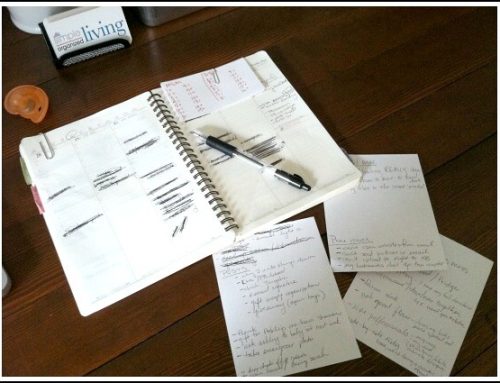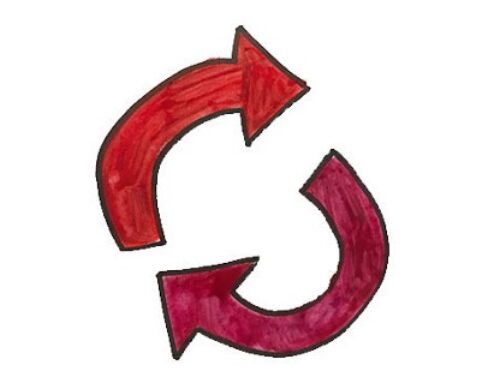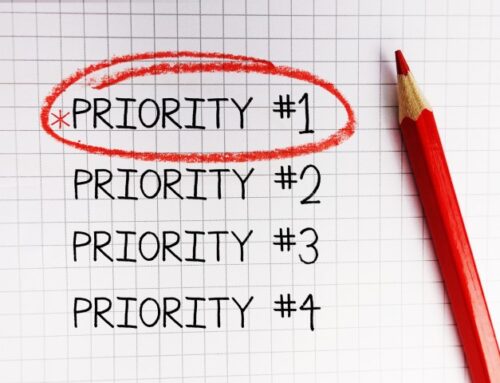6 Tips for Winning the Email Battle
November 9, 2018
Categories: Work
I still remember when getting an email was fun and exciting, like getting a handwritten note in the mail. Those days are over. Now I get between 50-100 emails per day. Sometimes it seems as if email is running my life. I struggle to make progress on the projects that are most important to me.
Maybe you can relate. Maybe you spend too much time on email, but don’t know how to change. Or perhaps you get distracted by email, and struggle to maintain focus on your key projects or task list.
In this blog post, I want to share 6 tips to help you win the email battle. If you put these tips into practice, you will be able to efficiently work through email and respond to people quickly. You can stop email from distracting you from important work projects. You will be able to use email to help your life, rather than letting email run your life.
Paradigm Shift
Before I share the 6 tips, I want to share a paradigm shift for how to think about email. A paradigm shift is a fundamental change in approach or underlying assumptions. If you only remember one thing about this blog post, this is the big one. If you only make one change in your email habits, this is the one to make. All 6 tips stem from this paradigm shift: Think of email as a task to be completed, rather than a chronic interruption on your time.
Often we work with our email open on our computer. We start working on a project, only to be interrupted by a notification telling us we have received a new email. We read the email, and think about how to respond. The email might be important, or it might not be important. The email might request something from us. If it does, we stop what we are doing and complete the request instead. The result of this pattern is we are consistently interrupted by email. If I receive 60 emails in an 8-hour workday, that’s one email interruption every 8 minutes. Research shows we struggle to regain focus once we are interrupted. Multitasking doesn’t result in better performance. It’s better to focus on one thing at a time. Consistent email interruptions destroy our focus and productivity.
This paradigm shift re-frames email from a chronic interruption to a task to be completed. A task has a firm beginning and end point. A task is something we check off and are done with for the day. After we finish a task, we feel a sense of accomplishment, and we stop thinking and worrying about it. It is possible to do email this way.
6 Tips for Winning the Email Battle
Now that we understand the paradigm shift, here are 6 tips for winning the email battle:
1. Schedule a specific time each day to respond to email
Put email into your schedule like you would a meeting with a colleague. For example, depending on your schedule, you might schedule 1-1:30 PM as your time to respond to emails. If you need two time periods to respond to email, you might schedule one time in the morning (e.g., 10-10:30 AM) and one time in the afternoon (e.g., 4-4:30 PM). When it is your time to do email, focus on that task. Put away all other distractions, and work through your email inbox. Be as quick and efficient as possible.
2. During all other times, NO EMAIL
During all other times, don’t respond or check your email. Don’t have your email open on your computer. Don’t check email on your phone. Turn off email notifications. As challenging as it may be at first, use your discipline and wait to check email during your scheduled time.
3. Finish one important task before checking email
Most people check their email first thing in the morning. This is a bad idea. If you do this, you are setting yourself up for failure and distraction. Instead, finish one important task first thing in the morning. I like to check my email in the early afternoon, and use my morning to complete one important task. Completing one important task at the start of your day will give you a sense of accomplishment that sets the tone for the rest of your day. Completing one important task first thing in the morning will also ensure you at least get one thing done each day, even if you receive an important email that you need to address.
4. When responding to email, use the “WTF” approach
When I’m working through email, I use a strategy I call the “WTF” approach. Most people read their emails multiple times, and don’t respond right away. This is a huge waste of time, because you end up doing the same thing (i.e., reading the email) over and over again. Instead, a better strategy is to respond right away using the “WTF” approach. When I read an email, I make a decision and do one of three things immediately:
- Write: Option 1 is to write a response. Think about how you would like to respond to the email, and then write a response right away. After you write a response, trash or file the email.
- Trash: Option 2 is to trash the email. If the email isn’t important, or you don’t want to respond, delete it and be done with it. If you wrote a response and don’t need to save the email, trash it.
- File: Option 3 is to file the email. If you need more time to think about the email, file the email. Make good use of your folders and have one labeled “Respond Later.” If you wrote a response and want to save the email, file it. I have folders to file emails from various people in my life (e.g., students, journals, collaborators, etc.).
5. Use email signatures to save common emails
You may have certain types of emails that you send regularly. For example, I often get emails from students asking whether I plan to take a graduate student to work with me in the upcoming application cycle, or to describe my research interests in more detail. I can save a common email as an email signature, and personalize as needed.
6. Train the people in your life to accept your email pace
When I talk to people about email, they often make the point that their job moves at such a fast pace that they need to respond to email right away. I suppose there might be exceptional circumstances where this may be the case. But in most cases, the reality is that immediate responding is not necessary. Rather, people are used to having you respond right away, so it seems like they need an immediate response. But in most cases, the world does not end if you don’t respond to an email right away. If you use the strategy I suggested, you will still be able to respond to every email within 24 hours, which I think is a reasonable time frame.
Discussion
What do you think of the paradigm shift of thinking about email as a task to complete rather than a chronic interruption? What do you think of the 6 email tips? What struggles have you had in changing the way you do email? What has been most helpful for you in winning the email battle?

Related Thoughts
No Comments
Leave A Comment

Subscribe To My Newsletter
Join my mailing list to receive the latest blog posts.
Receive my e-book “The Mental Health Toolkit” for free when you subscribe.






Well, I was tempted to respond right away, but now I’m thinking I should wait 24 hours…hmmm…perhaps responding to a blog post is in a different category!
You have some GREAT thoughts here. One word of caution is to say that we now have jobs that ARE quick-email-respondent necessary. I tend to be a proponent of the 6 steps but have come to see that there are segments where a different approach is necessary. Also some personality or work style types are able to have a higher capacity for “interruption” than others.
All in all though people, I agree that people would be more strategic about their email management and I will be forwarding this blog to at least one person that I know that could benefit.
Good point about acknowledging that some folks do need to respond quickly given their job or work context. Also you make a good point about how people might differ in their abilities to multitask and regain focus following an interruption. I wonder if there has been any research done on that!
I love this, Josh. There is a lot of wisdom in your suggestions & I’m going to aim to implement them 🙂 Thank you!
Email is time consuming, and the 6 concrete tips are most helpful. Appreciate the “paradigm shift” idea, and love Kuhns’ work so this resonated with me. WTF approach hilarious, and certainly easy to remember– challenge will be getting out of old patterns and for those of us that want to please others, let go of that, and realize that we can be more of who we need to be by being more organized and intentional. I do get distracted by email, and interrupted by it, so engaging in the paradigm shift will be a challenge, but I’m taking it on for sure! Thanks Josh!!! 🙂
[…] Check your email only once per day. Schedule in a time during your work day to do email (e.g., 1-2pm). If more immediate communication is important at your job, schedule two email times (e.g., 10-11am, 4-5pm). During these times, focus only on your email and work through your emails. Other than your scheduled times, turn off your email. Don’t check email on your phone. […]
[…] life, it’s easy to get off track. There are so many things competing for our time and attention. Emails, social commitments, hobbies, volunteering at church, etc. How do we keep ourselves focused on […]
[…] And even when I have down time, I get bored quickly, so I have a tendency to fill the time with checking email, facebook, or […]
[…] tasks. I know this is true for me. There are so many things that compete for my time and attention. Emails from colleagues and students. Grading papers. Responding to various requests. These are all good things that need to be done, […]
[…] resolved to not do ANY work. I didn’t do any work on my projects, I didn’t write any blogs, and I didn’t check my email. I just… rested and relaxed. I went for a walk, I read a book, and I watched a lot of […]
[…] going on a big, important task, but for some reason, we can’t seem to get into gear. Instead, we waste time checking email or social media. We tell ourselves we will start the workout program next week. We say there will […]
[…] keep our energy focused, we have to ruthlessly eliminate distractions. Schedule specific times to check email, browse social media, and watch television. Put your phone on silent and schedule a time to make […]
[…] other day, I was spending a lot of time on my iPhone—checking email, posting on social media, and reading articles on ESPN. There’s nothing wrong with those […]
[…] I’ve been working on lately is trying to accomplish my 3 most important tasks (MITs) BEFORE I check email and start responding to folks. This shift has been a game-changer for my work and productivity, […]
[…] and effectiveness. You know you have work to do, but you find yourself getting distracted with email, social media, or watching television. How do can some people hammer out astounding amounts of […]
[…] is the primary mode of communication. We are on email constantly. Although extremely convenient, email can be challenging to navigate because it is very distracting. It takes our attention away from our most important tasks, and […]